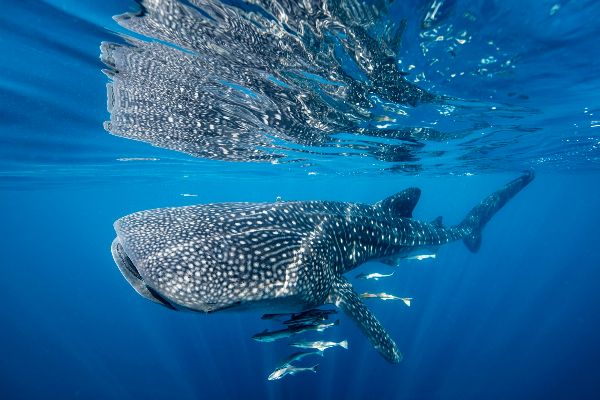Satellite Tracking Reveals Threat To Biggest Fish In Sea
Lethal collisions of whale sharks with large ships may be vastly underestimated, potentially helping to explain why the biggest fish in the sea is in decline, according to new research.

“Collision risk with marine vessel traffic is only starting to be recognised as a serious threat that may require mitigation efforts, and it’s important that New Zealand take this seriously,” says Dr Mark Erdmann, of the University of Auckland and Conservation International, who was a co-author of the study led out of the UK. “There are plans to start a whale shark tagging program to better understand this endangered species’ movements in Aotearoa’s coastal waters.”
Whale sharks are slow-moving ocean giants which feed on microscopic animals called zooplankton. Their numbers have been declining around the world.
Scientists from international research institutions and universities tracked 348 satellite-tagged whale sharks in research led by the Marine Biologicial Association of the UK and the University of Southampton in the UK.
Tags recorded cases of whale sharks moving into shipping lanes and then sinking slowly to the seafloor hundreds of metres below, the ’smoking gun’ of a lethal ship strike.
“Our results point to potential high levels of undetected or unreported ship strikes, which may explain why whale shark populations continue to decline despite protection and low fishing-induced mortality,” the researchers wrote in the paper. “Collision mitigations in high-collision-risk areas appear necessary to help conserve this iconic species.”
New Zealand’s whale sharks couldn’t feature in the study because none were satellite tagged, said Dr Erdmann. (Dr Erdmann’s team from Conservation International, a nonprofit environmental organisation, contributed tracking data on more than 20 whale sharks tagged in South-East Asia.)
“We really know almost nothing about where New Zealand’s whale sharks move or spend most of their time.
“Based on sightings from fishers and boaties, we know that there is a population of whale sharks off the eastern coast of the North Island, from Bay of Plenty to North Cape.
Slowing ships would cut the threat of lethal collisions, reduce sound pollution that harms underwater creatures, and lessen greenhouse gas emissions, according to the paper’s authors.
The journal article, entitled
“Global collision-risk hotspots of marine traffic and
the world’s largest fish, the whale shark,” is being
published in the journal PNAS (Proceedings of the National
Academy of
Sciences).


 Bill Bennett: Download Weekly - How would NZ telecoms cope with another cyclone
Bill Bennett: Download Weekly - How would NZ telecoms cope with another cyclone NZ On Air: Firm Audience Favourites Lead NZ On Air Non-Fiction Funding
NZ On Air: Firm Audience Favourites Lead NZ On Air Non-Fiction Funding Insurance and Financial Services Ombudsman: Woman Gets $40k More After Disputing Insurer’s Decision
Insurance and Financial Services Ombudsman: Woman Gets $40k More After Disputing Insurer’s Decision BNZ: A Quarter Of Older NZers Fear Going Online Due To Scam Concerns
BNZ: A Quarter Of Older NZers Fear Going Online Due To Scam Concerns University of Auckland: Scientists Develop Tool To Monitor Coastal Erosion In Fine Detail
University of Auckland: Scientists Develop Tool To Monitor Coastal Erosion In Fine Detail Oji Fibre Solutions: OjiFS Proposes To Discontinue Paper Production At Kinleith Mill
Oji Fibre Solutions: OjiFS Proposes To Discontinue Paper Production At Kinleith Mill



